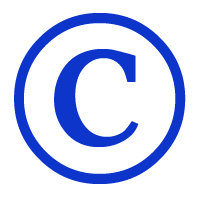
You've just completed your manuscript. Your novel. Your opus. Your glorious addition to the world of literature. Now you want to share it with the world, but a nascent thought tickles your mind.
What if somebody steals my work?
You just put your blood, sweat, and tears into your baby, and soon it will be in the hands of reviewers, agents, editors, et cetera. What's to keep some dirty criminal from snatching up your prize, beating you to the copyright office, and claiming the rights to your work before you do?
Broaching the subject on writing forums is likely to get you a 50/50 response, with half the users patting your head and calling you a cute little newbie to the world of writing, while the other half warn you to hide your manuscript under your aluminum foil hat for several months until somebody at the copyright office gets around to sending you that shining piece of paper that proves your work is yours. Still others will make suggestions like mailing a copy of your manuscript to yourself before you share it with the world and leaving it sealed, with the idea that the postmark from the United States Postal Service will hold up in court should you have to sue anybody over intellectual property rights. Another suggestion I've heard is asking potential reviewers, or those who might have reason to come in contact with your pre-published work, to sign a non-disclosure agreement.
Well, I'll tell you one thing. If you approached me as a potential agent/reviewer/reader or even publisher for your work, and you asked me to sign a legally binding
anything simply for the privilege of basking in your glory, then you're going straight to the wastebasket in favor of the hundreds of folks a week who are sending me manuscripts to review and not asking me to get involved in a legal quagmire.
Thankfully, the concept of copyright isn't all about a race to see who can get the first little piece of paper to back up their ©, and it's not nearly as troublesome a subject as one might think. Copyrights cost a little money and a lot of time, but they don't have to.
The Berne Convention for the Protection of Literary and Artistic Works is good reading material for those who want to know. The gist is that your work is automatically protected by copyright the moment you write it, and this copyright is recognized in all of the nations that participate in the Berne Convention. The United states has been a participating member in Berne since 1989. Spiffy, no? You can read more about Berne at
Copyright.gov. While you're there, be sure to check out
§104 and §104(a) of Title 17 of the United States Code.
If you're still worried, take the following points into consideration:
- Just as a reputable publisher and/or agent is never going to charge you for their services, they're also not going to take your submitted manuscript down to the copyright office, slap a certificate on it, and spirit it away while you wait around with bated breath wondering if they're interested in representing you. That's not the point of their business. Agents and traditional publishing houses deal with gazillions of manuscript submissions a year. They make no money by stealing your work, and they don't have the time to risk dropping their slush pile in favor of chasing after fame and fortune by pretending to be somebody else.
- Consider that as authors, we think of our works as our beloved, polished children (myself included). Just like a chef in the Chopped Kitchen who can't believe somebody wasn't amazed by the sweet zing of honey they added to their soy sauce, we authors sometimes have a hard time accepting the idea that while we may have written a great story, we haven't actually redefined literature in our society. Unless you have a considerable track record as a published author, a potential plagiarist has little, if, anything, to gain from stealing your work. If you already are a notable author, a plagiarist still has little to gain, since it now boils down to a question of your word versus theirs.
- Before you invest the time and money into a copyright certificate for your novel, are you absolutely certain that your manuscript will undergo no significant changes before it goes to print? Minor editorial changes are one thing, but if you're planning to change anything significant, you enter into a grey area called 'substantial and creative' changes. Ever wonder how Walmart can get away with marketing 'store brands' of patented products, with identical ingredient lists, same shape/color packaging, and so forth? Patents may be somewhat different that copyrights, but the core concept is the same - your non-editorial changes just ended up constituting a new derivative work. If you really wanted that piece of paper so badly, you may just find yourself back at square one.
- Did I mention that Berne is automatic, and should take care of all those sticky little 'substantial and creative' changes nicely? Being free and not taking months to accomplish are some pretty nice bonuses too.
If after reading all of the above you're still convinced your perfect manuscript (that will never need to be significantly edited in any way) is best kept in a locked box under your bed until the certificate of copyright arrives, well...that's your prerogative. Just bear in mind that there's an easier and cheaper way, and all it involves is slapping 'Copyright [dates] by [author/owner]' on your first page (or words to that effect). I jazz it up a little and use the following:
- The Goldenwealth Light (The Traveler of Ord, Book I)
Copyright © 2012 Scott McCloskey
All rights reserved. This book is protected under the copyright laws of the United States of America. Any reproduction or unauthorized use of the material herein is prohibited without the express written permission of the author.
Oh, and don't forget...
- All situations and events presented in this book are works of fiction. All characters portrayed are creations of the author's imagination - any resemblance to actual persons, living or dead, is purely coincidental.
Feel free to employ some useful derivative with your own name and book title. I won't even come after you for infringement of the copyright on my...copyright statement.
Or something.
 I'm pleased to announce that Charon Coin Press has chosen to feature my work as part of their upcoming horror anthology Paying the Ferryman!
I'm pleased to announce that Charon Coin Press has chosen to feature my work as part of their upcoming horror anthology Paying the Ferryman!
